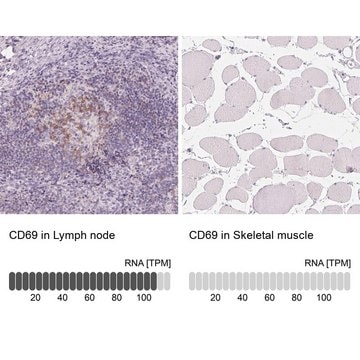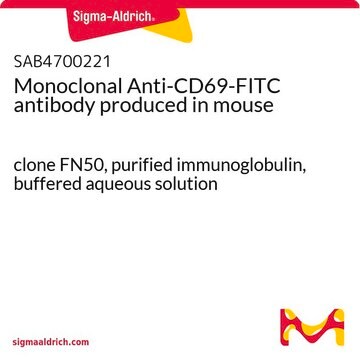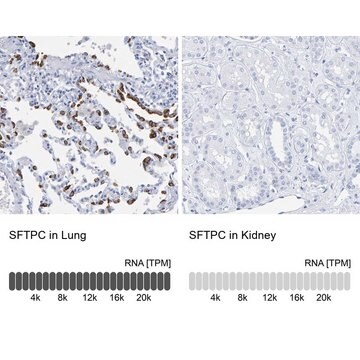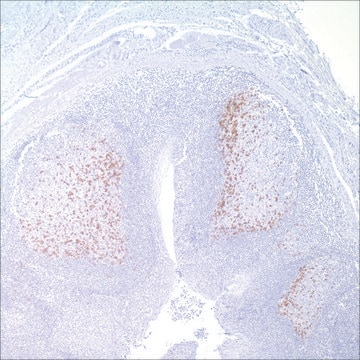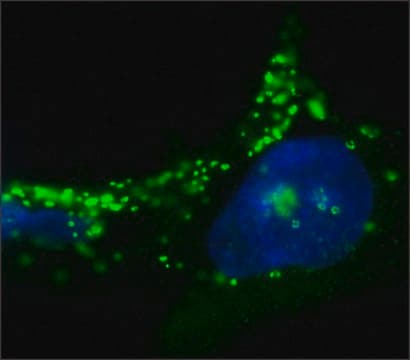SAB4700220
Monoclonal Anti-CD69-APC antibody produced in mouse
clone FN50, purified immunoglobulin, buffered aqueous solution
Se connecterpour consulter vos tarifs contractuels et ceux de votre entreprise/organisme
About This Item
Code UNSPSC :
12352203
Nomenclature NACRES :
NA.41
Produits recommandés
Source biologique
mouse
Niveau de qualité
Conjugué
Allophycocyanin conjugate
Forme d'anticorps
purified immunoglobulin
Type de produit anticorps
primary antibodies
Clone
FN50, monoclonal
Forme
buffered aqueous solution
Espèces réactives
human
Technique(s)
flow cytometry: suitable
Isotype
IgG1
Numéro d'accès NCBI
Numéro d'accès UniProt
Conditions d'expédition
wet ice
Température de stockage
2-8°C
Modification post-traductionnelle de la cible
unmodified
Informations sur le gène
human ... CD69(969)
Description générale
Cluster of differentiation 69 (CD69) is a type II integral membrane protein, encoded by the gene mapped to human chromosome 12p13.31. CD69 is a member of the C-type lectin family of surface receptors. The encoded protein is expressed in all bone marrow-derived cells, with the exception of erythrocytes.
The antibody FN50 recognizes CD69, an lymphocyte early activation marker.
Immunogène
anti-mju-stimulated human B lymphocyts
Application
The reagent is designed for Flow Cytometry analysis of human blood cells using 10 μL reagent / 100 μL of whole blood or 1e6 cells in a suspension. The content of a vial (1 mL) is sufficient for 100 tests.
Actions biochimiques/physiologiques
Cluster of differentiation 69 (CD69) exerts a pro-inflammatory effect by activating leukocytes. In humans, CD69 negatively regulates immune reactivity. Knockout/ deficiency of the gene increases the risk of susceptibility to autoimmune and chronic inflammatory diseases. The encoded protein might act as a prognostic marker for bendamustine response in chronic lymphocytic leukemia (CLL) patients. CD69 facilitates natural killer (NK) cell function. In addition it also helps in activation and differentiation of a wide variety of hematopoietic cells.
Caractéristiques et avantages
Evaluate our antibodies with complete peace of mind. If the antibody does not perform in your application, we will issue a full credit or replacement antibody. Learn more.
Forme physique
Solution in phosphate buffered saline containing 15 mM sodium azide and 0.2% high-grade protease free BSA as a stabilizing agent.
Clause de non-responsabilité
Unless otherwise stated in our catalog or other company documentation accompanying the product(s), our products are intended for research use only and are not to be used for any other purpose, which includes but is not limited to, unauthorized commercial uses, in vitro diagnostic uses, ex vivo or in vivo therapeutic uses or any type of consumption or application to humans or animals.
Vous ne trouvez pas le bon produit ?
Essayez notre Outil de sélection de produits.
Code de la classe de stockage
10 - Combustible liquids
Classe de danger pour l'eau (WGK)
WGK 2
Point d'éclair (°F)
Not applicable
Point d'éclair (°C)
Not applicable
Faites votre choix parmi les versions les plus récentes :
Déjà en possession de ce produit ?
Retrouvez la documentation relative aux produits que vous avez récemment achetés dans la Bibliothèque de documents.
Is CD69 an effective brake to control inflammatory diseases?
Gonzalez-Amaro R
Trends in Molecular Medicine, 19, 625-632 (2013)
CD69 expression potentially predicts response to bendamustine and its modulation by ibrutinib or idelalisib enhances cytotoxic effect in chronic lymphocytic leukemia.
Montraveta A
Oncotarget, 7, 5507-5520 (2016)
The activation antigen CD69
Ziegler SF
Stem Cells, 12, 456-465 (1994)
Genome-wide association study and meta-analysis finds over 40 loci affect risk of type 1 diabetes
Barrett JC
Nature Genetics, 41, 703-707 (2009)
Costin Tomescu et al.
Journal of immunology (Baltimore, Md. : 1950), 179(4), 2097-2104 (2007-08-07)
In vivo, several mechanisms have been postulated to protect HIV-1-infected cells from NK surveillance. In vitro, previous research indicates HIV-1-infected autologous CD4(+) primary T cells are resistant to NK lysis. We hypothesized that NK lysis of HIV-1-infected target cells would
Notre équipe de scientifiques dispose d'une expérience dans tous les secteurs de la recherche, notamment en sciences de la vie, science des matériaux, synthèse chimique, chromatographie, analyse et dans de nombreux autres domaines..
Contacter notre Service technique